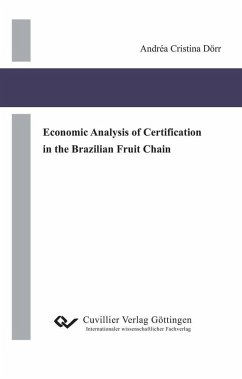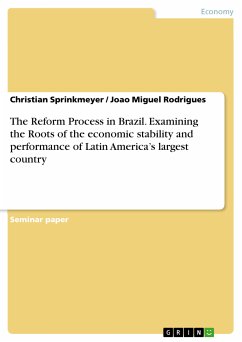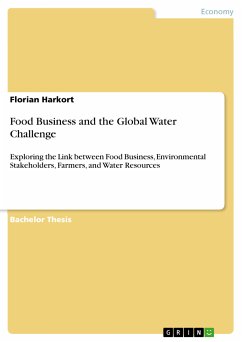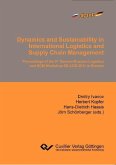Producers and exporters of fresh fruits and vegetables from developing countries like Brazil are increasingly required to demonstrate the safety and traceability of their produce up to the consumption stage. In order to access international markets such as the European Union (EU) and the United States (US), fruits producers need to meet the requirements from the buyers and comply increasingly with certification systems. In Brazil, these are specifically the Integrated Fruit Production (PIF), GlobalGAP, Fairtrade and Organic certification schemes. Not clear is the impact these certification schemes have on Brazilian fruit farmers. There is some evidence in the literature, that certification contributes positively to the development of specific export sectors in developing countries. In fact, the Brazilian export market is still relatively underdeveloped, with an export share of only 2.4% of the total produced volume. However, certification may also have the effect of a non-tariff trade barrier, undermining the capability and financial ability of especially small-scale farmers in exporting to international markets. This study, therefore, aims at providing an economic analysis of certification in the Brazilian fruit chain.
A survey of 303 grapes and mango farmers was conducted in 2006 in the Juazeiro/Petrolina region of the Sao Francisco Valley in Brazil. The survey continued interviewing 85 cashew nuts farmers and conducting six case studies with melon growers in the Serra do Mel/Mossoró region in the semi-arid zone of the Northeast of Brazil. Certified and non-certified farmers as well as those in process to obtain certification were included in the sample.
To analyze the primary data, a conceptual framework of the marketing chain and the farmers’ adoption decision was first developed. Then, different theoretical and empirical approaches which are relevant for the analysis of certification, were added to the framework. The descriptive analysis has been complemented by some econometric models. The LOGIT model was used three times: first, for identifying the determinants of the adoption of certification and second, for determining the factors relevant for adopting two versus one certification scheme, and third, for testing the main factors that lead farmers to adopt specifically PIF. Several tests were performed to check the robustness of the models.
Comparative analyses between certified and non-certified farmers of grapes, mango, melon and cashew nuts show that certified farmers receive higher net income than non-certified farmers. The net income of the farmers in process is slightly lower compared to certified farmers. The higher net income partly derives from the price premium paid for the certified fruits. Certified mango and grapes farmers have received an increased price per kg of 58% and 28%, respectively. Cashew nuts farmers receive the highest rates: 82% per kg of nuts and 62% per kg of kernel. Melon producers do not receive a price premium after adopting certification, but certification enables them to remain in the market. Other benefits identified refer particularly to environmental, health and food safety aspects. The costs of certification are found to be of minor importance, especially since financial support is provided by Brazilian governmental organizations like SEBRAE and EMBRAPA. Investments due to certification are partly considerable, but are outweighed by higher productivity and price premia. The price premia of small-scale farmers have been found to be lower compared to those of the medium-scale farmers, but the farmers are still able to compete.
The logistic estimates show that education and the years of experience mostly have a positive and significant effect on the decision to adopt certification. The chances to certify decrease, however, when farmers are dependent on the income from non-agricultural activities, are living in rural villages and not on the farm and trade with an individual buyer using a verbal trust-based arrangement. The estimates on separate grapes and mango models also find the size of the farms and the share of the current irrigated area to negatively contribute to the chances of adoption. The decision of mango and grapes farmers to adopt two instead of only one certificate was found to be influenced by whether the farmer can made use of the packing house from the group, cooperative or association. Variables such as ‘years trading with the buyer’ and ‘living in the city’ have negative and significant influence on the decision making.
An analysis of the grapes and mangoes marketing chains reveals that certified producers generally trade with groups, cooperatives or associations, while non-certified farmers trade with individual buyers. Groups, cooperatives and associations generally contribute to upgrade mostly certified farmers. Written contracts are more often found between groups and farmers. Uncertified farmers, however, trade more often with individual buyers based on verbal contracts. Such marketing chains are less vertically integrated and present low asset specificity.
Dieser Download kann aus rechtlichen Gründen nur mit Rechnungsadresse in A, B, BG, CY, CZ, D, DK, EW, E, FIN, F, GR, HR, H, IRL, I, LT, L, LR, M, NL, PL, P, R, S, SLO, SK ausgeliefert werden.









